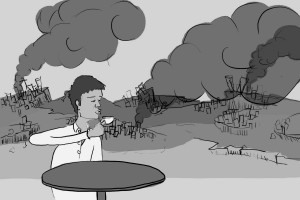Persistent warnings make us think twice
We’ve all heard the same story over and over: Experts predict a major earthquake in Southern California. We obsess over food supplies and the structural integrity of our bedside desks and then after a few days we forget our fears and move on.
If you’re one of those people who’s become pretty sick of the entire routine, you’re like me. As a native Angeleno, I’ve become all too familiar with this sequence.
Last week, a new report from earthquake experts predicted a major earthquake (somewhere around a magnitude 8.0) is due to hit Southern California in the next few years. As always, I felt a little distraught after hearing such news but after watching T.V. and talking to some friends I forgot about it entirely.
Yet, there is certainly a benefit to this annoying cycle of being scared for a day, recovering, and then being scared again. By constantly reminding us of the so-called “big one,” earthquake experts and government officials are keeping the threat from slipping to the back of our minds for too long. If each time we hear the latest earthquake prediction we make a few preparations before our attentions spans inevitable meander back to football or Jersey Shore, we better our chances of coming out of the earthquake unscathed.
Let’s face it. As Southern Californians (and college students) our minds are constantly on the run. Our thoughts are usually so scattered that even an 8.0 earthquake takes the backseat to midterms, internships or that weird sound your car started making on the freeway yesterday.
We need these constant reminders that force us to prepare because unlike other natural disasters such as hurricanes, snowstorms and typhoons, earthquakes pose a different kind of threat.
The difference is surprise.
Susan Hough writes that hurricanes can be tracked for weeks on weather radars before they strike, as can snowstorms and typhoons. This gives potential victims a short warning time to stock up on emergency supplies and prepare themselves for the onslaught of an upcoming natural disaster.
But the time and place of an earthquake can’t be predicted in advance, which is why it’s so important that we use the constant warnings as an alarm system, reminding us to prepare a little more each time.
Attending USC, we can be assured that our buildings are earthquake-safe and our basic needs provided for. USC’s emergency preparedness website is also helpful in telling students (especially those not from Southern California) how to prepare for, act during, and react after the earthquake.
The initial effort in making sure we have all of our personal necessities lies with us. As an Angeleno who has gone through the 1994 6.7 magnitude Northridge Earthquake, I can honestly say that you really do need to have your emergency supplies ready to go. I remember my father having to walk to the nearest grocery store (no one was driving since the traffic lights were out and some freeway overpasses had collapsed) to buy water bottles, and even when he arrived there the store only took cash.
The cost of taking the time to inventory your emergency supplies is much lower than potential problems that can arise after an earthquake. Having an adequate supply of drinking water, canned food, cash, batteries, flashlights and blankets are absolutely necessary to deal with the potential problems that can arise post-earthquake.
Frequent reminders and warnings may be annoying, but in this case they’re necessary; they don’t allow us the luxury of ignoring an inconvenient truth. We’ve all seen the immense damage caused by other natural disasters — disasters that, in some cases, people expected.
Because we won’t have that warning, we should embrace the constant stream of earthquake talk and let it motivate us to prepare ourselves rather than viewing it as an annoyance or a burden.
Angad Singh is a junior majoring in international relations and communication.

